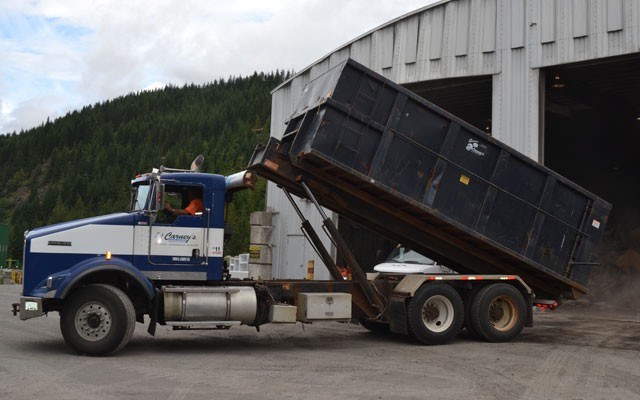Carney's Waste Systems must show it can cuts costs to Whistler's $5 million garbage services if it's to keep its long-held municipal contract.
"If we can save them money, we will; we always have," said owner Owen Carney as he prepares to make his case for keeping the municipal contract.
For about 40 years, Carney's has held a virtual monopoly on Whistler's garbage in contracts negotiated about every five years. The last contract was negotiated in 2008.
The municipality, however, is developing new performance-based contracts for its garbage and composting services with a double goal — reduce costs and divert more waste from the landfill.
The new contracts will be released in a competitive proposal process in the coming weeks, which could entice other contractors to the Carney's corridor.
"Some of the things that Whistler sometimes suffers from is a lack of competition because we are a little bit removed from the main happenings down in the Lower Mainland," explained James Hallisey, Whistler's manager of transportation and solid waste.
"We sometimes have trouble getting enough contractors... to make it truly competitive. The packages are going to be big enough that we think we will attract some significant players to it."
Whistler has long used Squamish-based Carney's Waste Systems, and its subsidiary Evergreen Projects, to handle its garbage, recycling and composting.
Under the Local Government Act, municipalities are allowed to forgo a competitive bidding process for specialized work if there aren't enough companies to bid on the work. Carney's, for many years, was the only contractor in the area with the required experience.
Both contracts with Carney's — one for the composting facility operations and one for the solid waste management — have expired.
Carney's has agreed to continue operations under the terms of the agreements on a monthly basis until Whistler develops new contracts.
The goal, said Hallisey is to have those new contracts in place by May before major changes come into effect with Multi-Material British Columbia (MMBC). That's when Whistler will no longer require recycling transportation services from the Nesters and Function Junction depot sites, work that will be taken on by MMBC.
Hallisey said "performance-based" is the latest buzzword in the industry, essentially rewarding the contractor if they are able to divert more waste from the landfill in Washington State.
Under the terms of the current solid-waste contract, Carney's gets paid more if there is more garbage to handle. There is no financial incentive for the contractor to promote diversion or put systems in place that will allow compostables and recyclables to be diverted from the garbage stream.
Owen Carney said Whistler is not alone in developing these contracts. Squamish too is looking at a competitive process, as is the regional district.
In Whistler's case, the contracts are the first step in fleshing out the Solid Waste Management Strategy, which includes several recommendations.
"By 2020, which isn't that far away anymore, we're looking at an annual savings of $430,000 which is worth us spending some time and effort to get there," said Hallisey.
Whistler's annual solid-waste operating costs total roughly $5 million. Of the operating costs, roughly $1.8 million goes to operate the compost system, $145,000 goes to residential recycling, $1.9 million is spent on garbage handling and disposal and approximately $250,000 is spent on overhead, staff, drywall recycling, landfill maintenance and snow clearing.
The municipality has a separate contract with Regional Disposal Company for transportation and disposal of its garbage in Washington State. The municipality pays Regional Disposal Company by the container to transport garbage from Surrey to its site in southeastern Washington. This contact is valid until November 2020.




